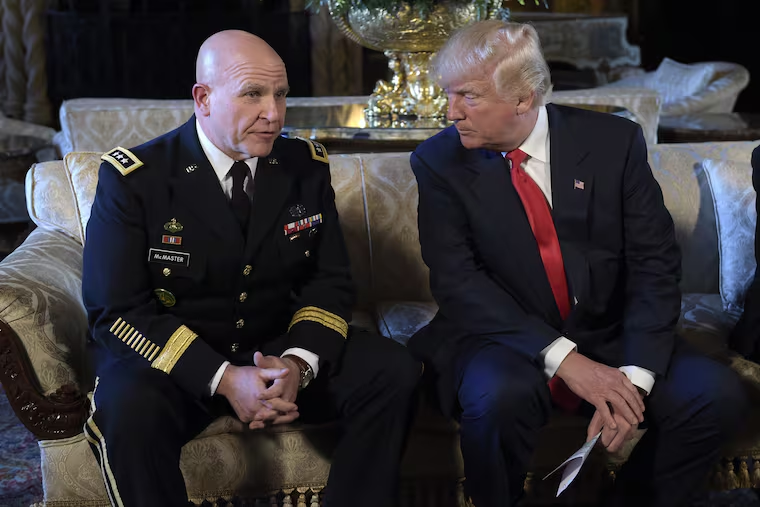H.R. McMaster wants the next president to defend the free world without illusions | Trudy Rubin
H.R. McMaster wants the United States to stay engaged abroad without trying to remake the world.

In February 2017, I showed up for an interview with Lt. Gen. H.R. McMaster, who was visiting Philadelphia’s Foreign Policy Research Institute.
The highly respected three-star general was known as a military strategist who challenged conventional thinking. I’d met with him several times before, in Iraq, Afghanistan, and even in Philly (where he grew up). But this meeting turned out to be the most startling.
McMaster had just received a phone call from the White House inviting him to an interview with President Donald Trump for the position of national security adviser (suddenly open after the firing of Michael Flynn). As we spoke, his phone kept ringing. He got the job only to be pushed out by Trump a year later after long-running tensions over the president’s resistance to any coherent policy process.
So, when McMaster produced his new book, Battlegrounds: The Fight to Defend the Free World, many expected another tell-all on Trump. And there is plenty of criticism in the book of Trump policies on Russia, tariffs, treatment of allies, and Afghanistan — but no juicy details of internal White House battles. (The retired general is so opposed to military criticism of elected leaders that he has never voted.)
» READ MORE: I've covered rigged elections abroad but now I worry about my own vote being counted | Trudy Rubin
Instead, as McMaster told me by phone from Stanford’s Hoover Institution earlier this month, he is trying to do something different, as we face a critical presidential election: criticize the foreign policy mistakes made by both Democrats and Republicans in recent decades and layout the elements of “a rational foreign policy.” Such a policy would be defined neither by America First isolationism, nor the “strategic narcissism” that tries to remake the world.
That is a tall order in an irrational age but is the kind of national debate we desperately need and may never be able to hold.
As McMaster pointed out, public confidence in foreign policy has been soured by military failures from Vietnam to Iraq. Americans (and the world) have also lost faith in U.S. competence after the 2008 financial crisis and our handling of COVID-19.
“There is strong isolationist sentiment in both political parties towards retrenchment,” he says, rightly, “and towards withdrawal from significant challenges overseas.”
Yet, this historian-warrior believes it is critical “to convince the public they need sustained engagement abroad in order to protect security at home. We have to recognize our limits, but also the dangers of disengagement and withdrawal.” He stresses that we cannot avoid strategic competition with Russia and China that could become increasingly dangerous if we don’t deal with them firmly.
His adamant declarations about Russia’s involvement in election meddling infuriated Trump. “Absolutely, it is strategic narcissism to trust Putin,” McMaster told me. “Vladimir Putin will never be [Trump’s] friend or abandon his strategy to bring us down or pit us against each other. Vladimir Putin is the best liar in the world.”
But to push back against Putin’s mischief in Europe, the Mideast, and elsewhere, McMaster insists America must cooperate with like-minded partners. “Whatever administration gets in, we need NATO and our allies more than ever to deal with emerging threats. There is no single-state solution to confront Russian efforts to drag down democracies, or to confront China’s efforts to promote its authoritarian, mercantilist system at the expense of democracies.”
He doesn’t think the U.S. will pull out of NATO, even if Trump wins a second term, because Congress and the public recognize its value. That, I believe, is a risky assumption.
As for Asia, McMaster believes alliances with Asian nations are getting stronger because those nations fear a China that has become more aggressive in its neighborhood and beyond. (I’d note that China’s overconfidence has helped overcome Trump’s insults to crucial Asian partners.)
When it comes to China, McMaster is more complimentary toward Trump’s policies and critical of Barack Obama’s policy of engagement. “You have to credit the Trump administration for the long-overdue shift in China strategy,” he argues. He points to Xi Jinping’s jingoistic pronouncements about overtaking the United States militarily, economically, and technologically.
However, he recognizes that the U.S. has failed to muster its economic and technological strength to compete with Beijing. This would take leadership that looks beyond personal relationships with Xi and closely coordinates with Asian allies, including on tariffs.
I agree that China policy needed to shift to push back against the new Chinese expansionism. A Biden administration should, and would probably — although not definitely — continue that trend.
But there is one salient point McMaster makes repeatedly, that I think may be the most important. If we are to compete effectively with Moscow and Beijing, we must first address the partisan politics that are ripping our country apart.
» READ MORE: Putin and Xi won the debate and could win the election, too | Trudy Rubin
“My biggest disappointment during this election campaign is the doubts raised by the president about our democratic process and the elections,” he told me. “The minimum we must do to cope with Putin is not be our own worst enemy.”
I’d add, the minimum we must do for a coherent foreign policy is come together over addressing our present domestic madness.
A Biden administration would attempt that healing. A Trump victory would amplify America’s bitter divisions, while further diminishing our foreign standing. And that would make any chance for a more realistic foreign policy next to nil.